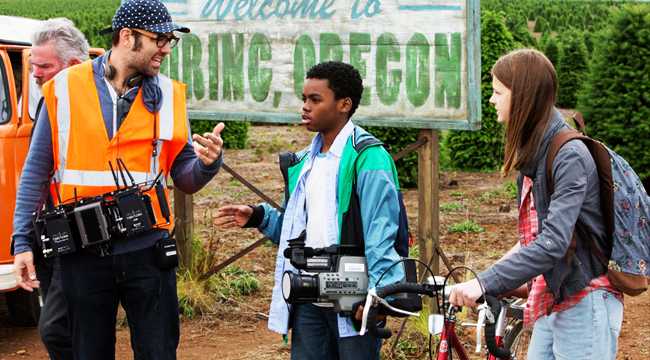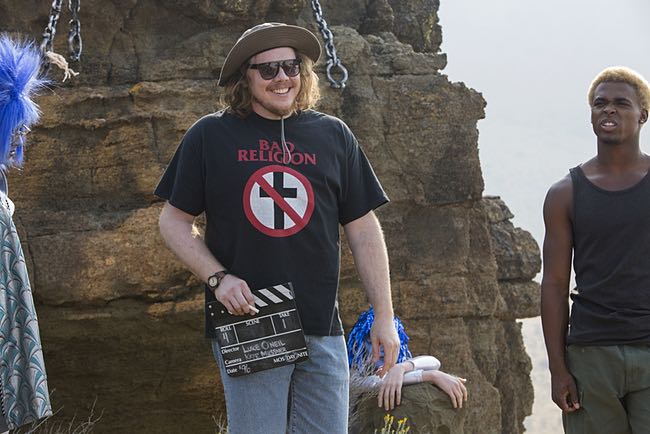
On Friday, Netflix premiered Everything Sucks!, a high school comedy set in Oregon in 1996. I liked it a lot, especially as it calmed down a bit on the ‘90s music and pop culture references and focused on its collection of appealing, if often sad, characters.
I spoke with the show’s creators, Ben York Jones (who also plays AV Club supervisor Stargrove) and Michael Mohan (pictured above with stars Jahi Winston and Peyton Kennedy), about the series’ origins, why it starts off in this particular year, ‘90s pop culture they hope to get to in future seasons, and more, with some spoilers for the season coming up just as soon as the fake mustache works like a charm…
Where did the idea for this come from?
Ben York Jones: Mike and I started working together about five years ago, and few years into our collaboration, realized that we wanted to tell a coming-of-age story. And so we figured what better time to set that than when we were both in high school, which is the 90’s. As the idea developed, we realized it would be an ensemble piece, it would be a period piece, and it would be in the vein of what we’re most comfortable with, which is kind of honest, handmade-feeling stories about people dealing with their emotions.
It’s a combination of two types of characters you don’t usually see in these kinds of stories. At the forefront, you have a girl coming to terms with being gay, and you have a black film nerd, neither of which are that that common within the genre.
Michael Mohan: For Luke, very early on we realized that all the qualities that make Luke who he is — like you said he’s a movie nerd, he’s super magnetic and charming, he has a crush on an unobtainable girl — none of these qualities are race-specific, and so in that regard it would be almost regressive to assume that he would be a white character. Really, the question for us is just why not make him a young man of color? And what was great when we were developing it, we really worked with Jahi and Claudine, who plays the mom. So when we were rehearsing their scene, we’d rewrite the dialogue together so it felt more authentic to their experience. That’s how we dealt with that.
Jones: As far as Kate goes, the show being first and foremost and ensemble piece, we just really felt that it would make for the most compelling of coming of age stories for her. We hadn’t really seen it in the way that we wanted to do it. So that was the motivation.
Mohan: Yeah 1996, even Ellen DeGeneres hadn’t come out of the closet yet, so this 15-year-old girl living in a small town in Oregon, we just imagine that must be a very difficult internal process for her, and we tried our best to put ourselves in her shoes for a moment as we were writing her part.
With the music and other pop culture references, how did you figure out what to use and where?
Jones: Well, all of our choices are derived from character first and the narratives that unfold because of the characters we develop. Unfortunately, even though it was 20 years ago, the 90’s are accessible enough to Mike and I that suddenly you’d go, “Oh it would make sense if this character had a Tamagachi,” or “Oh it would make sense if this character drank Surge.” So that’s how the references came up is just starting from a place of character.
There’s one in particular I’m curious about, which is Ken is very excited about how things are going with Luke’s mom, and he is dancing and singing along to “Breakfast at Tiffany’s” as he comes into the house. Why that song in that moment?
Jones: I guess because it’s sunshiny and kinda rockin’, and w joke that Ken Messer’s musical taste could best be described as the soundtrack at Applebee’s. Anything that would play there is probably in Ken’s musical rotation. Somehow that song, even though we love it, became the flagship of that rotation.

Ben York Jones
I’m not sure if I’ve even seen a high school series before where the most sympathetic character perhaps winds up being the high school principal. Did you start out with that much empathy for Ken, or did it develop over the course of things?
Jones: That’s interesting that you say that, because I think it’s dawning on us that we didn’t even think about that until right now. I mean, so much of the credit for how sympathetic this character is goes to Patch, our actor, who just drops this perfect balance of humor and heart into it. But really, when you dig down this is a guy who’s got a lot of pain in his past, and he’s using his ability to be so nice all of the time almost as a mask. And so when you first see him, you just think he’s just a straight up nice guy who’s nice all the time to everybody, and it’s almost a little fake. Derek’s performance isn’t fake, but the actual enthusiasm and positivity is a little fake. And then you realize later that, oh wow, this is a guy with so much pain and dealing with so many emotions in his path that he’s trying to get over.
Mohan: Kate even calls him out on this somewhere in the middle of the series. She says, “What’s going on with you, you seem happy.” And he says, “I’m always happy”, and she replies, “Yeah, but you seem happy for real.”
Did you go through other iterations of what the movie would be before you landed on ’50s alien invasion, or was that always the concept from the beginning?
Mohan: Honestly not. It was always gonna be a 50’s sci-fi. I think one of the shared experiences that Ben and I had in high school was getting together with our friends and watching terrible movies on Friday nights. Sometimes watching Mystery Science Theater 3000, and that was just ingrained in these characters from the get-go. So for them to make a bad 50’s sci-fi movie in the end, it just felt true to their characters. I would have to say personally, when I was in high school, I grew up in a small town called Norton, MA, and our senior class play was called “Norton vs the Ubiquitous Flying Saucer”, which was kind of this really absurd 50’s sci-fi. We didn’t have an AV Club, and so it somehow just felt very natural for these characters to do that.
At the very end of the season, Leroy comes back to check out what has happened to his family while he’s been gone. What ideas do you have so far for Season 2, assuming that Netflix wants to do more?
Jones: Not only are we still developing those ideas, but you have to just wait to see them too, I think.
Before that cliffhanger, though, this season could almost be a self-contained entity with a beginning, middle, and end. How much have you thought about what year two would be?
Jones: We’ve thought about it a great deal and hope the details will hopefully, if it comes true, it should be good at season two.
Mohan: We write in Ben’s office, and we just cover the walls with these giant Post-Its, so if you were to walk in there right now, it kinda looks like something out of like when they’re tracking down the killer in Seven, with little notes scrawled here and there. But it’s actually a map for what season two would be.
Are there certain either songs or just things from the ’90s that you did not manage to get into these 10 episodes that you really, really would like to in a second season?
Mohan: Yeah. Third Eye Blind. Their album came out in 1997, and our show takes place in 1996, and there were so many instances where a Third Eye Blind song would have been the perfect soundtrack to a scene, but we couldn’t do it because it wasn’t period appropriate.
Jones: Couldn’t justify it.
Mohan: So in season two, Third Eye Blind, guaranteed.
Jones: 100 percent.
So then why specifically 1996? It could’ve been any year, you could’ve easily moved into ’97 if you’d wanted to.
Jones: Well, there’s really two reasons, the first of which is it’s kind of right in the middle of my high school career and Mike’s high school career. Mike, you started in ’94?
Mohan: Yep.
Jones: And I started in ’98. So we figure if Luke’s a freshman, we have four years of high school for him, and it kinda intersects our high school careers. And the second reason is, setting it in ’96 means Luke graduates in the year 2000, and we thought there was something interesting to a parallel being drawn between the end of high school and stepping into the year Y2K, like you’re stepping into this new paradigm, and it’s kind of the unknown and it’s a little bit scary. There was something mildly romantic about that that we liked.
Alan Sepinwall may be reached at sepinwall@uproxx.com. He discusses television weekly on the TV Avalanche podcast. His new book, Breaking Bad 101, is on sale now.
